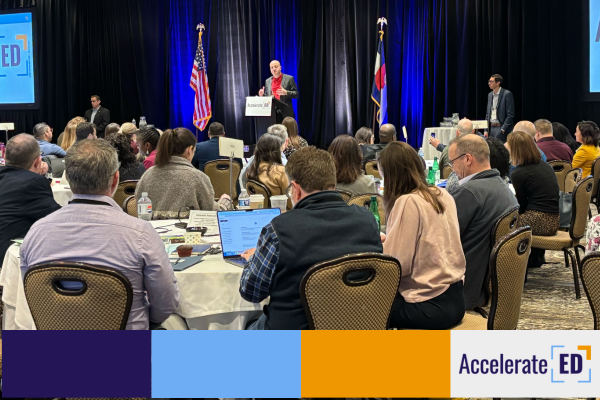Celebrating Accelerated Pathways in Colorado

Co-authored by Adam Lowe
Over 200 local, state, and national leaders in the Accelerate ED community gathered in Denver in March to showcase and advance innovative high school-to-college pathways programs. Practitioners from three dozen school districts, community colleges, intermediary organizations and partners across fifteen states shared their successes in implementing and scaling accelerated pathways to propel high school students on a more direct pathway to college degrees with value in the workplace.
Their work transforming schools and student experiences around the country was complemented by community college, business, and nonprofit leaders from Colorado who shared a decade-long journey in designing systems at the state level to expand access to high quality pathways. Colorado has emerged as a leader in this work: for example, the percent of high school students taking dual enrollment (known as concurrent enrollment in Colorado) exceeds the national average. The state has invested heavily in the creation of a statewide longitudinal data system to track education and workforce outcomes, and coupled that with a rich infrastructure of intermediary organizations and businesses supporting career-connected learning. Colorado Governor Jared Polis shared the importance of breaking down silos between higher education and workforce development, and measuring how well educational systems lead to rewarding careers.
Since launching in 2022, Accelerate ED has fostered and supported a vibrant community committed to better align high school with real-world career experiences and to embed sequenced college courses to provide students real momentum toward a career-relevant associate’s degree and beyond. Cross-community learning opportunities gave participants actionable ideas on a variety of topics, including dual enrollment programming in rural areas, leveraging data to drive impact, creating community-wide efforts to advise students, models for employer collaboration, and state policy that supports accelerated pathways.
The convening also provided interactive sessions where participants collaborated to identify barriers to access, equity, quality, and scale. Some of the rich array of ideas and reflections that emerged in the conversation:
- Whether for entrance exams, rigorous courses, apprenticeships, etc., as much as possible we should be bringing it TO the students AT the high school because it removes barriers and improves equity.
- “Start local, expand regional, and inform state policy bidirectionally” by lifting up local impact to inform state level work.
- We need more dual credit educators, so we need policies that encourage that outcome, such as dual credit tuition reimbursement for teachers.
- Often, it can be challenging to find high quality work-based learning opportunities, particularly in rural communities; when possible leverage employment opportunities with municipal government and school districts for those WBL opportunities.
- These programs need data to show longitudinal economic mobility to build buy-in from lawmakers–and secure funding–but they need money to build the systems to track data and impact.
- Academic advising is critical for successful pathways initiatives; but it is challenging to make academic advising both effective and efficient.
- There is a mindset that pathways are for students who will not pursue postsecondary education, rather than something that every student could benefit from. We have to change that–not just because we think pathways students shouldn’t be marginalized, but because it really is so valuable for all students.
Many of the lessons learned from Accelerate ED communities are highlighted on the Accelerate ED resource hub, which features over 60 curated tools and publications from ESG and peer organizations on dual enrollment pathways, work-based learning, and aligned advising.
The work of the Accelerate ED community continues to inform a national pathways movement that is changing the way communities support youth in their journey from high school into careers. A newly-launched Commission on Purposeful Pathways is engaging current students and recent graduates to better understand what experiences successfully enable students to earn college degrees necessary to successfully launch their careers. Their findings will serve as a foundation for the Pathways Impact Fund, a new national initiative incubated by StriveTogether in partnership with the Walton Family Foundation and Gates Foundation, to support communities so all our students get on a promising and meaningful path during high school.



